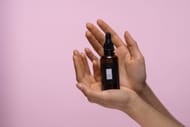Acne is a common skin condition that affects many individuals, often leaving behind stubborn reminders in the form of acne scars. While acne scars can be a source of frustration and self-consciousness, it's essential to remember that effective treatment options are available.
In this article, we will explore how to identify different types of acne scars and discuss proven techniques to treat them, allowing you to regain your smooth and flawless complexion.
Identifying Acne Scars

Acne scars come in various forms, and understanding the specific type of scar you have is crucial for determining the most suitable treatment approach. The two primary categories of acne scars are atrophic scars and hypertrophic scars.
Atrophic scars are characterized by depressions or indentations in the skin, while hypertrophic scars are raised and often more prominent. Identifying the type of acne scar you have will help guide your treatment choices and maximize their effectiveness.
Ice Pick Scars
Ice pick scars are small, narrow depressions that extend into the dermis, giving the skin an appearance similar to being pierced by an ice pick. These scars are common and challenging to treat. They often develop as a result of deep inflammation and collagen damage during acne breakouts. Treatments for ice pick scars may include:
1) Chemical peels: These peels use acids to remove the damaged top layer of the skin, encouraging the growth of new, healthier skin cells.
2) Micro-needling: Micro needling is a procedure involves creating controlled micro-injuries to the skin, stimulating collagen production and minimizing the appearance of scars.
3) Laser resurfacing: Fractional laser treatments can target specific areas of scarring, promoting collagen remodeling and improving skin texture.
Boxcar Scars

Boxcar scars are broader and have well-defined edges, resembling a boxcar or a crater on the skin's surface. They occur when collagen is lost in the area where an inflammatory breakout once took place. To treat boxcar scars effectively, options include:
1) Dermal fillers: These injectable substances help raise the depressed area, making the scar less noticeable.
2) Chemical peels: Similar to ice pick scars, chemical peels can assist in minimizing the appearance of boxcar scars.
3) Microneedling with PRP: Platelet-rich plasma (PRP) can be combined with microneedling to enhance collagen production and promote skin rejuvenation.
Rolling Scars
Rolling scars create a wave-like appearance on the skin, caused by fibrous bands of tissue forming beneath the surface. These scars often respond well to the following treatments:
1) Subcision: This procedure involves breaking the fibrous bands beneath the skin, allowing the rolling scar to become less noticeable.
2) Dermal fillers: By injecting fillers into the depressed areas, the skin's surface can be leveled, reducing the appearance of rolling scars.
3) Laser therapy: Laser treatments can help stimulate collagen production, improving the overall texture and appearance of rolling scars.
Preventing and Treating Acne

While treating acne scars is crucial, preventing acne breakouts is equally important. To reduce the risk of scarring, adopt a comprehensive approach to acne treatment, which may include:
1) Proper skincare routine: Cleanse your face twice daily with a gentle cleanser and use non-comedogenic moisturizers and sunscreen.
2) Avoid picking or popping pimples: Picking at acne lesions increases the likelihood of scarring, so resist the temptation.
3) Consult a dermatologist: Seek professional guidance for effective acne treatment, such as topical retinoids, antibiotics, or oral contraceptives.
Incorporate the following tips into your daily routine to promote healthy skin and aid in the treatment of acne scars:
1) Exfoliate: Regular exfoliation helps remove dead skin cells, promoting cell turnover and reducing the appearance of scars. Use a gentle exfoliator once or twice a week to avoid irritation and inflammation.
2) Hydrate: Keeping your skin hydrated is essential for its overall health and appearance. Choose moisturizers that are non-comedogenic and specifically formulated for acne-prone skin.
3) Protect from the sun: Sun exposure can worsen the appearance of acne scars and cause pigmentation changes. Always apply a broad-spectrum sunscreen with an SPF of 30 or higher before going outside, even on cloudy days.
4) Professional treatments: In addition to the at-home treatments mentioned earlier, professional treatments performed by a dermatologist or skincare professional make use of more intensive and targeted approaches. These may include laser therapy, chemical peels, microneedling, or dermabrasion. These procedures can help stimulate collagen production, reduce scar visibility, and improve overall skin texture.
5) Scar-reducing creams and serums: Certain over-the-counter products contain ingredients such as retinol, vitamin C, hyaluronic acid, and peptides that can help fade acne scars over time. These products work by promoting collagen production, improving skin elasticity, and reducing hyperpigmentation.

Acne scars can be emotionally distressing, but with the right knowledge and treatment options, you can effectively reduce their appearance and regain your confidence and smooth complexion. By identifying the specific type of acne scar you have, whether it's ice pick scars, boxcar scars, or rolling scars, you can tailor your treatment plan for optimal results.
Remember, treating acne scars takes time and patience, and results may vary depending on the severity of the scars and individual skin response. It's essential to consult with a dermatologist or skincare professional who can assess your skin condition and recommend the most suitable treatment options.
Additionally, it's crucial to maintain a consistent skincare routine to prevent future acne breakouts and minimize the risk of developing new scars. Cleanse your face twice daily using a gentle cleanser to remove dirt, excess oil, and impurities. Use non-comedogenic moisturizers and sunscreen to keep your skin hydrated and protected from harmful UV rays.
